www.aljazeerah.info
News, September 2014
Archives
Mission & Name
Conflict Terminology
Editorials
Gaza Holocaust
Gulf War
Isdood
Islam
News
News Photos
Opinion Editorials
US Foreign Policy (Dr. El-Najjar's Articles)
www.aljazeerah.info
|
Editorial Note: The following news reports are summaries from original sources. They may also include corrections of Arabic names and political terminology. Comments are in parentheses. |
183 Syrians-Iraqis Killed in US-Led Air Strikes, Israelis Report on Nine Japanese Fighting with ISIS
September 26, 2014
Editor's Note:
By the second day of the US-led air strikes on Syria, targeting facilities held by ISIS and Nusra in the Sunni territory, more death and more destruction have been inflicted on Syrians and Iraqis. Initial counts so far refer to 183 people killed, including children and other civilians. We may never know the actual number of people killed and injured, because of the lack of interested institutions, with the exception of the London-based SOHR.
The two Shi'i sectarian regimes in Syria and Iraq are among the beneficiaries of this war, which may end up enabling them to restore their subjugation and oppression of Sunnis in Syria and Iraq. The new Iraqi prime minister shamelessly claimed yesterday that ISIS would attack the New York City subways, in an attempt to get more US support to his sectarian regime. The US intelligence community did not buy his ploy, to his disappontment!
The war industry in the US and other NATO countries is a major beneficiary of this war, as it cashes trillions of dollars from the Empire permanent wars, after its success to replace the Cold War against Communism by the permanent global war against Islamism.
The fascist, Zionist, Apartheid state of Israel benefits most from all US-led wars in the Middle East, as these wars devastate and destroy Arab states, one after another, preparing the region for the planned Israeli Empire from the Nile to the Euphrates, God forbid!
Creative Destruction: The Name of the Game in the Middle East
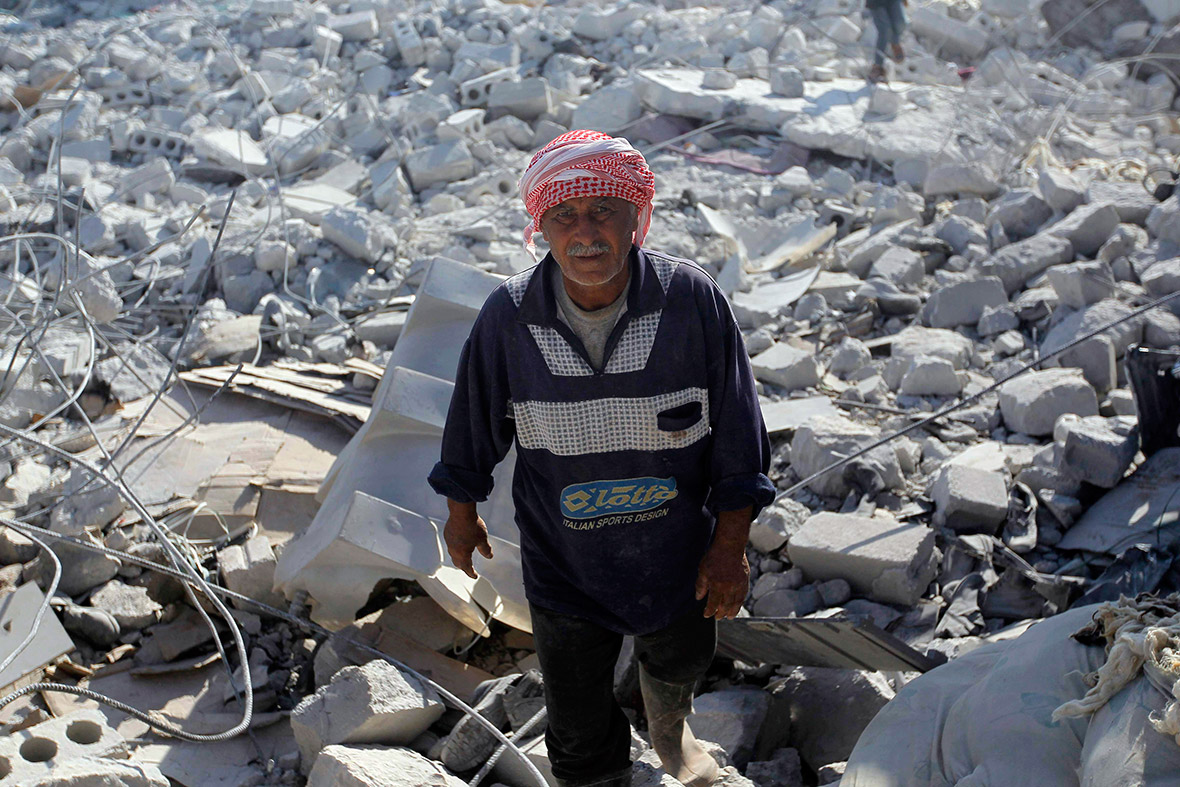 |
 |
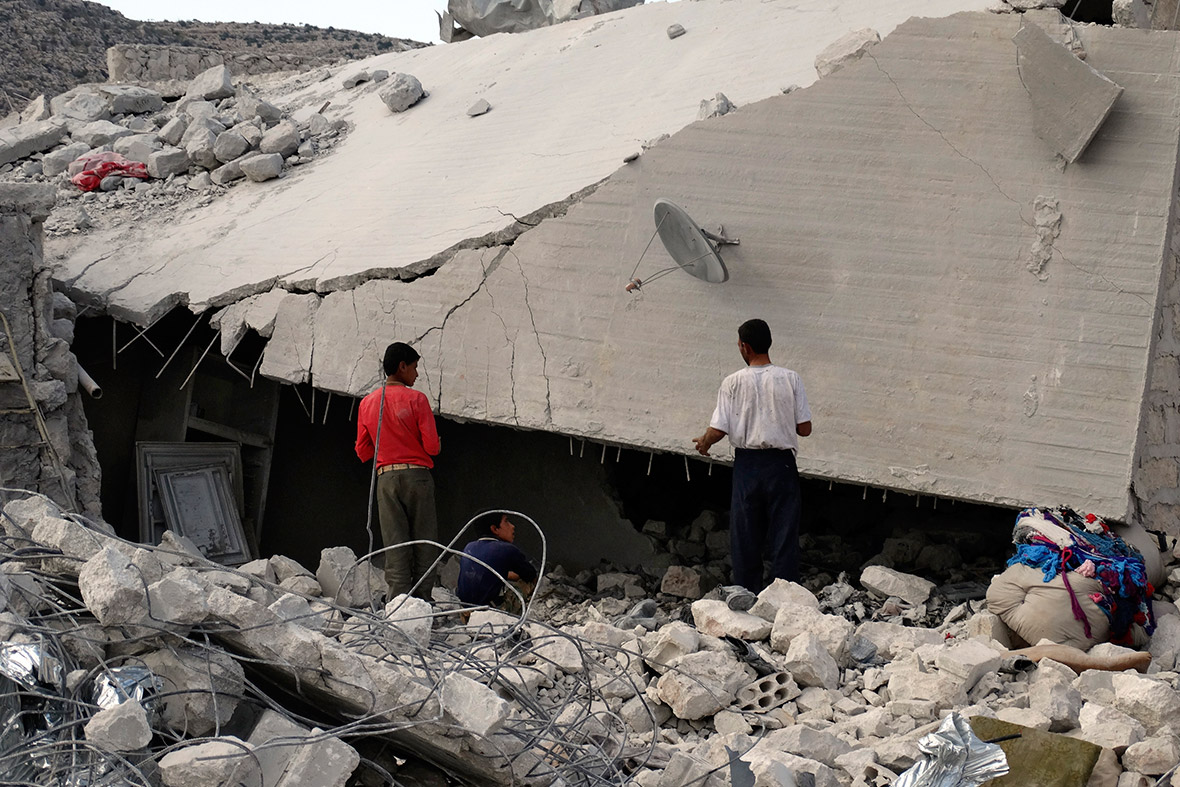 |
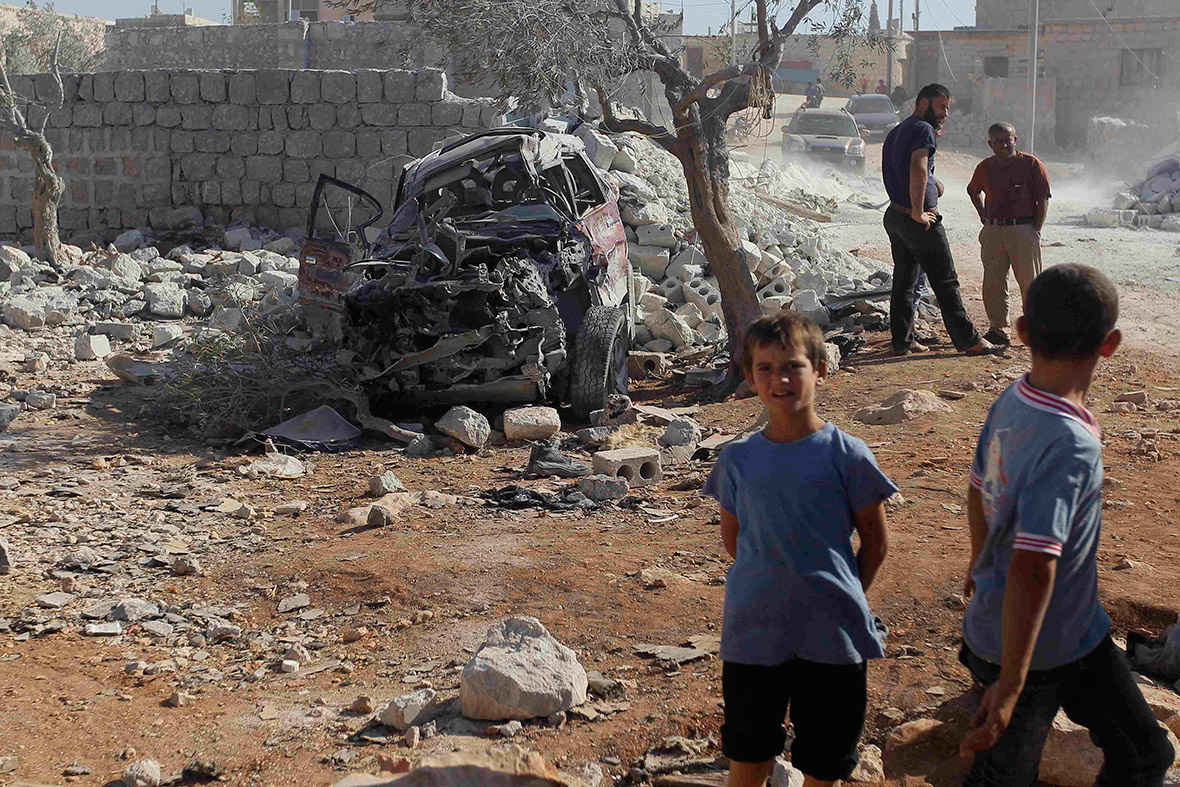 |
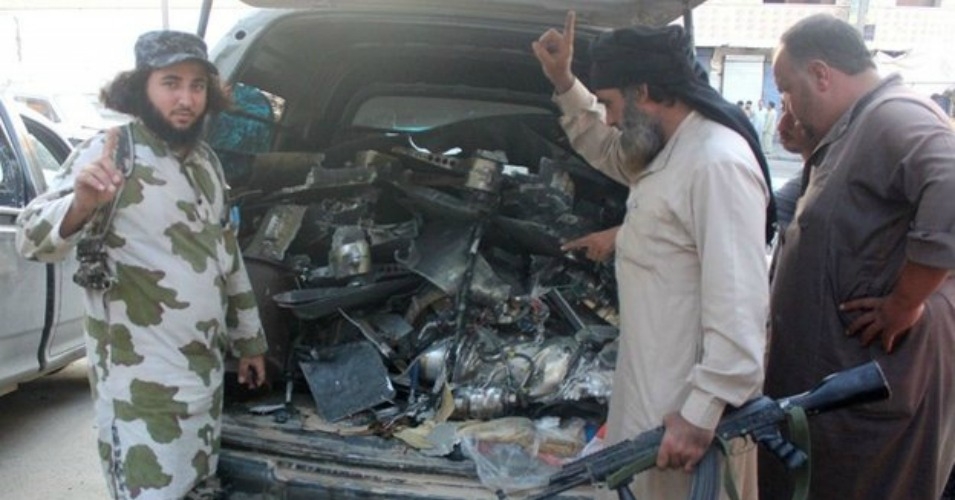 |
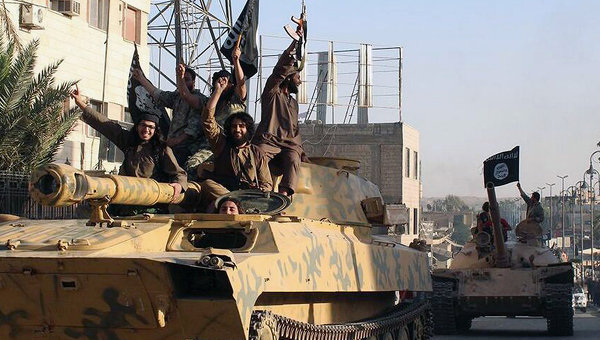 |
Civilian Deaths Mount as US Bombing of Syria Expands
'We will pay with our blood,' says Abu Ibrahim, who fled his city of Raqqa ahead of US bombing. 'In big wars, the civilian will pay.'
Common Dreams, September 26, 2014
With a new wave of U.S.-led airstrikes overnight in Syria, reporting from the ground inside the country show that in addition to the damage being done to Islamic State (or ISIS) targets and other militant factions, the civilian death toll is rapidly increasing.
According to the UK-based Syrian Observatory for Human Rights, bombings on oil refineries held by ISIS in the northeast of Syria killed fourteen militants associated with the group, but also five civilians. In total, since the bombing of Syria began on Monday, SOHR estimates that of the 183 total killed by U.S. bombs, 36 were non-combatants, many of them women and children.
Early Thursday, CNN reports:
The U.S. military has not released details of the damage caused by the latest round of airstrikes.
But the Pentagon said these coalition attacks focused on pummeling mobile oil refineries used to fund the terror group.
ISIS makes up to $2 million a day from the oil produced by the mobile refineries, Pentagon spokesman Navy Rear Adm. John Kirby said.
Meanwhile, France conducted new airstrikes in Iraq Thursday morning, French government spokesman Stephane Le Foll told reporters in Paris.
France and the United States began striking ISIS targets in Iraq before a U.S.-led coalition starting bombing ISIS targets in Syria this week.
Kirby vowed that more U.S. attacks will come.
"This is the beginning of a long effort," he said. "There will be more."
In the city of Raqqa, which was rocked by airstrikes on Monday and Tuesday, residents were frightened.
"The people are very afraid," resident Abu Ibrahim Raqqawi told the BBC, "they do not know what will happen tomorrow."
On Tuesday, the Guardian newspaper spoke with a 20-year-old Syrian named Hiba, a student in the city of Raqqa which has faced the most serious bombing to date. Even though opposed to the ISIS fighters, Hiba described the U.S. attacks as nightmarish.
“There are no words to describe the bombing," she said. "It was a scene I wouldn’t wish my worst enemy to face. I was on the balcony with my little sister and we could hear the sound of planes and I was joking with her and said: ‘Comb your hair and smile, you are being filmed.’"
“Later," Hiba continued, "the bombing started and we all ran to the living room, everyone screaming and running in different directions. We didn’t know what to do. Our neighbour went to the hospital and asked if they needed blood and they said no because they haven’t got any injuries. Most people who left their homes live near Isis headquarters. We won’t leave our home. There is no point. We believe in destiny.”
And Abu Ibrahim, quoted above by the BBC, is interesting because he, along with other residents of Raqqa, have set up a website called Raqqa Is Being Slaughtered Silently and though they are opposed to ISIS overall, and have chronicled the damage done to their city by the ongoing civil war, they remain deeply skeptical about the outcome of U.S. bombing. As the BBC report continues:
When Abu Ibrahim last spoke to the BBC, just before President Obama's announcement on Syria, he had warned of the dangers of American military action in Syria.
"The people are against IS, but if the USA bombs Raqqa, we will be with IS against the USA," he said.
While Tuesday's strikes on strategic targets like the IS-held Tabqa air base and the jihadist group's headquarters in central Raqqa were welcomed by Abu Ibrahim - albeit with caution - it is not clear that they will be successful in the long term.
"Islamic State want these air strikes," he says, "because they know if it's just air strikes without forces on the ground, they will not fall down, and a lot of fighters will join them to fight the Americans."
Although IS has been engaged in deadly battles with rebel groups in Syria who reject its extremism, some fear that by creating a common enemy the US may yet unite them.
Although Raqqa residents do not think IS can be defeated without ground troops, that also seems to be something to which they are mostly opposed.
"Our city will be destroyed, we will pay with our blood," Abu Ibrahim says. "It will be a very big war, and in big wars, the civilian will pay."
This work is licensed under a Creative Commons Attribution-Share Alike 3.0 License
US-led strikes hit ISIS-held oil sites in Syria for 2nd day
Associated Press, By Jim Dolan
Friday, September 26, 2014 BEIRUT --
U.S.-led coalition warplanes bombed oil
installations and other facilities in territory controlled by the
Islamic State in Iraq and Syria (ISIS) in eastern Syria on Friday,
taking aim for a second consecutive day at a key source of financing
that has swelled the extremist group's coffers, activists said.
The strikes hit two oil areas in Dair El-Zoar
province a day after the United States and its Arab allies
pummeled a dozen makeshift oil producing
facilities in the same area near Syria's border with Iraq. The
raids aim to cripple one of the ISIS primary sources of cash - black
market oil sales that the U.S. says earn up to $2 million a day.
The Britain-based Syrian Observatory for Human Rights said the strikes
overnight and early Friday hit the Tink oil
field as well as the Qouriyeh
oil-producing area in Dair el-Zoar. It said air raids also
targeted the headquarters of the Islamic State group in the
town of Mayadeen.
The
Observatory said the strikes were believed to have been carried out by
the coalition. Another activist collective, the Local Coordination
Committees, also reported four strikes on Mayadeen that it said were
conducted by the U.S. and its allies.
The Observatory, which
relies on a network of activists inside Syria, said
there were reports of casualties in the
strikes, but did not have concrete figures.
The Observatory
reported another apparent coalition air raid on Islamic State positions
outside the city of Hassakeh in northeastern Syria near the Iraqi
border.
The strikes there targeted another oil production area,
as well as vehicles the militants had brought in from Iraq and tried to
bury in the ground to protect them, according to Observatory director
Rami Abdurrahman.
The U.S.-led coalition, which began its aerial
campaign against Islamic State fighters in Syria early Tuesday, aims to
roll back and ultimately crush the extremist group that has created a
proto-state spanning the Syria-Iraq border.
The air assault has
taken aim at Islamic State checkpoints, training grounds, oil fields,
vehicles and bases as well as buildings used as headquarters and
offices.
Activists say the militants have cut back the number of
gunmen manning checkpoints, apparently fearing more strikes. There has
also been an exodus of civilians from Islamic State strongholds.
"Everywhere where there are ISIS buildings, the people living around
these buildings are leaving. They are moving far from ISIS buildings,
either to other villages or to other areas in the same cities," said
Abdurrahman, using an alternative name for the group. "This has happened
in Raqqa, in Dair el-Zoar and in many towns and villages."
Raqqa,
an ancient city located on the Euphrates River in northeastern Syria, is
the de facto capital of the Islamic State group's self-declared
caliphate.
***
US Marine General: IS Prepares to Attack Baghdad Amid Airstrikes Launched by US-Led Coalition
MOSCOW, September 26, 2014
(RIA Novosti), Ekaterina Blinova -
Baghdad is most likely to become the next target of the Islamic State of Iraq and Syria (IS or ISIS), experts stress, as it has already seized an Iraqi military base on the doorstep of the capital.
"With coalition strikes underway into Syria and the very heart of the ISIS leadership, ISIS needs to respond. It needs to demonstrate to the world that the strikes haven’t hampered its ability to govern the land it now controls or, more importantly, to carry out attacks against those it is fighting. What better place than Baghdad? What better target than the Green Zone itself – the centerpiece symbol of America’s presence in Iraq," writes Lt. Col. Bill Cowan, a retired Marine and Fox News military analyst in his article "ISIS threat."
The retired Marine notes that the ISIS fighters had demonstrated "creativity" while taking over the military base. The Islamic State's fighters had launched an assault dressed in Iraqi army uniforms and riding in Humvees. Since the insurgents had been "disguised as a relief convoy," they entered the Iraqi military camp unscathed, Lt. Col. Bill Cowan stresses. "The Iraqi soldiers, totally taken by surprise and nearly out of ammunition after a week of fighting without resupply, fled in disarray," the retired Marine writes.
Although it is unlikely that the IS fighters will "duplicate" this strategy during their probable strike against Baghdad, the case has shown that ISIS is able "to get inside the perimeter" of the Iraqi capital and conduct a successful attack "on some weak spots," the military expert underscores.
Mushreq Abbas, a contributing writer for Al-Monitor’s Iraq Pulse, who has been managing editor of Al-Hayat’s Iraq bureau since 2005, claims that since September 21, the Islamic State "has started a new chapter in its wars west of Baghdad" amid the intensive air strikes launched by the US and its allies. ISIS took control of Saqlawiya and then it seized Fallujah – the strategic points, which are "sensitive [to the] movement of government forces." At the same time, the Islamic State tries to maintain its control over the territories south of Baghdad.
Citing security experts, Mushreq Abbas emphasizes that ISIS intends to "move the battle away" from its Mosul headquarters. The main vector of the IS military strategy will be directed at expanding of "the battlefronts" in order to "confuse" the US military forces. In addition the IS militant groups keep changing their location constantly, which makes it hard to detect and deal a fatal blow to the organization, the journalist notes.
Mushreq Abbas stresses that ISIS tries to persuade the Sunni Iraqi tribal leaders to join them. However, many Sunni clans and armed groups have not yet decided whether they would support the international alliance led by the US or the Islamic State fighters, the journalist underscores. He adds that the final position of Sunni tribes may play a crucial role in the war against ISIS.
Despite the efforts of the US-led coalition, ISIS continues to push ahead. Experts warn that the operation against the Islamic State will become a long and a costly one. The International Business Times reports that the US military campaign against ISIL is expected to last at least three years and cost approximately $10 billion.
Nine Japanese said to have joined Islamic State
TOKYO Fri Sep 26, 2014 9:07am EDT
(Reuters) -
Nine Japanese nationals have joined Islamic State, Japan's former air force chief, Toshio Tamogami, quoted a senior Israeli government official as saying, but the government's top spokesman said on Friday it had not confirmed the information.
Tamogami, now a senior official of a tiny new political party, said on his blog that Nissim Ben Shitrit, the director-general of Israel's foreign ministry, told him this month that nine Japanese had taken part in Islamic State. (This implies that Israelis have a relationship with ISIS or at least elements in ISIS work for them ... make your own conclusions).
Asked about the possible participation of Japanese citizens in the militant group, Chief Cabinet Secretary Yoshihide Suga told a regular news conference, "The government has not confirmed such information."
No one was immediately available for comment at the Israeli embassy in Tokyo, at the Israeli foreign ministry or at the Japanese foreign ministry.
Tamogami told Reuters that no details besides the number of Japanese participants were given to him in his meeting with Nissim Ben Shitrit, a former ambassador to Japan.
"I don't know anything further," Tamogami said. "He was tight-lipped."
Tamogami's blog shows the meeting took place on Sept. 12 in Israel.
About 1,000 recruits from a vast region stretching from India to the Pacific may have joined Islamic State to fight in Syria or Iraq, the head of the U.S. Armed Forces' Pacific Command, Admiral Samuel Locklear, said on Thursday.
His comment came as a threat by Philippine militants to kill a German hostage, in a show of solidarity with the Islamic State, has stoked fresh concern the Middle East brand of radicalism is winning recruits in Asia and posing a growing security risk in the region.
(Reporting by Kiyoshi Takenaka in Tokyo, Allyn Fisher-IIan in Jerusalem; Editing by Clarence Fernandez)
Shells land in Turkey as Islamic State advances on Syrian border town
By Jonny Hogg
KARACA Turkey Fri Sep 26, 2014 8:25am EDT
(Reuters) -
The Islamic State in Iraq and Syria (ISIS) fighters edged towards a strategic town on northern Syria's border with Turkey on Friday, battling Kurdish forces and sending at least two shells into Turkish territory, witnesses said.
Islamic State launched an offensive to try to capture the border town of Kobani more than a week ago, besieging it from three sides. More than 140,000 Kurds have fled the town and surrounding villages since last Friday, crossing into Turkey.
The Sunni insurgents appeared to have taken control of a hill from where fighters of the YPG, the main Kurdish armed group in northern Syria, had been attacking them in recent days, 10 km (6 miles) west of Kobani, a Reuters correspondent said.
Booms of artillery and bursts of machinegun fire echoed across the border, and at least two shells hit a vineyard on the Turkish side. There were no immediate reports of casualties in Turkey and paramilitary police arrived to inspect the site.
"We're afraid. We're taking the car and leaving today," said vineyard owner Huseyin Turkmen, 60, as small arms fire rang out in the Syrian hills just to the south.
Kurdish forces said on Thursday they had pushed back the advance on Kobani, also known as Ayn al-Arab, by Islamic State fighters but appealed for U.S.-led air strikes to target the insurgents' tanks and heavy armaments.
"The clashes are moving between east, west and south of Kobani ... The three sides are active," Idris Nassan, deputy foreign minister for the Kobani canton, said by phone from the center of the town.
"They are trying hard to reach Kobani. There is resistance here by YPG, by Kobani and some volunteers from north Kurdistan -- Turkish Kurds -- who are coming to share in the efforts of Kobani. They have made a strong response," he said.
Kobani's strategic location has been blocking the Islamic State fighters from consolidating their gains in northern Syria. The group tried to take the town in July but was repulsed by local forces backed by Kurdish fighters from Turkey.
"EVERYONE IS ARMED"
"If they did come inside Kobani, everyone here is armed, they are armed and resisting. Even me, I am the deputy foreign minister here in Kobani canton but I am an armed man too. I am ready to defend Kobani," Nassan told Reuters.
"Every girl, every young man, every man who is able to fight, to carry a gun, they armed and they are ready to defend and fight."
Turkey has been slow to respond to calls for a coalition to fight Islamic State in Syria, worried in part about links between Syrian Kurds and the Kurdistan Workers Party (PKK), a militant group which waged a three-decade campaign against the Turkish state for greater Kurdish rights.
The PKK has called on Turkey's Kurds to join the fight to defend Kobani and accused Ankara of supporting Islamic State. Residents in the border area say hundreds of youths have done so, although Turkish security forces have been trying to keep them from crossing the frontier.
Turkey strongly denies it has given any form of support to the Islamist militants but Western countries say its open borders during Syria's three-year-old civil war allowed Islamic State and other radical groups to grow in power.
The Turkish military has in the past fired back when shells from Syria's civil war strayed into Turkish territory, and the intensifying battle for Kobani is heightening pressure on Ankara to take a more robust stance against the insurgents.
(Additional reporting by Sylvia Westall in Beirut; Writing by Nick Tattersall; Editing by Andrew Roche)
Qatar says fight against Islamic State will fail if Assad stays
DUBAI Fri Sep 26, 2014 7:59am EDT
(Reuters) -
Qatar's Emir Sheikh Tamim bin Hamad al-Thani has warned that the U.S.-led fight against the Islamic State will not succeed as long as Syrian President Bashar al-Assad remains in power.
U.S. and Arab forces have bombed Islamic State targets in northern and eastern Syria this week, following U.S. strikes since early August.
"We have to counter terrorism, yes. But I believe that the main cause of all this is the regime in Syria, and this regime should be punished," Sheikh Tamim said in an interview with CNN broadcast on Thursday.
Islamic State fighters have exploited the chaos of Syria's three-year-old civil war, which pits Assad and his allies against mainly Sunni Muslim rebels, to carve out territory in the country's eastern provinces.
Qatar, which has sent cash and arms to rebels fighting Assad, also supported the U.S. strikes against the Islamic State, contributing one plane on the first night of attacks on Tuesday.
Other U.S. allies Jordan, Bahrain, the United Arab Emirates and Saudi Arabia have joined in the strikes. All are ruled by Sunni Muslims and are opponents of Assad, a member of a Shi'ite-derived sect (Alawites), and his main regional ally, Shi'ite Iran.
The air raids follow growing alarm in Western and Arab capitals after the Sunni Islamic State, swept through a swath of Iraq in June, proclaimed a "caliphate" ruling over all Muslims.
(Reporting by Rania El Gamal; Reporting by Dominic Evans)
U.S.-led strikes pressure Al-Nusra Front group to join with Islamic State
BEIRUT Fri Sep 26, 2014 6:57am EDT
(Reuters) -
Al-Nusra Front is facing mounting pressure from its own members to reconcile with its rival, the Islamic State, and confront a common enemy, after U.S.-led air strikes hit both groups this week.
But that move would require pledging loyalty to the Islamic State, which has declared a caliphate in territory it controls in Iraq and Syria, which would effectively put an end to the Nusra Front, fighters in the group say.
Nusra, long one of the most effective forces fighting Syrian President Bashar al-Assad, was weakened this year by battles with the Islamic State.
But U.S.-led air and missile strikes, which have hit Nusra as well as Islamic State bases in Syria, have angered many Nusra members who say the West and its allies have joined forces in a "crusader" campaign against Islam.
Sources close to the Islamic State said some Nusra fighters were joining them after the strikes and there was a growing sense among many that it was time to put their differences aside.
"There are hardline voices inside Nusra who are pushing for reconciliation with Islamic State," a source close to Nusra's leadership told Reuters, though he doubted it would happen.
However, one Islamic State fighter said he believed there was an "80 percent chance that the brothers of Nusra will join the State".
The Syrian Observatory for Human Rights, a Britain-based monitoring group, said on Friday over 200 fighters had joined the Islamic State in the northern Aleppo area, many from the Nusra Front, since U.S. President Barack Obama said he was prepared to strike the group in Syria.
NO TRUST
Even before the air strikes, Nusra was facing difficulties and was losing fighters to the Islamic State, which is seen as more organized and determined to impose Islamic rule.
One former Nusra fighter inside Syria said the air strikes had strengthened Islamic State's position even further.
Yet sources from and close to both sides said it would be difficult for the two groups to work together without merging - and with Nusra in a weaker position, that would effectively mean being subsumed by the Islamic State.
(Editing by Alexander Dziadosz and Will Waterman)
British PM Cameron urges parliament to back 'years' of air strikes against IS in Iraq
LONDON Fri Sep 26, 2014 5:58am EDT
(Reuters) -
British Prime Minister David Cameron urged parliament on Friday to vote to approve "years" of air strikes against the Islamic State in Iraq and Syria (ISIS), saying the group was guilty of "staggering" brutality and posed a direct threat to Britain.
Cameron recalled parliament from recess for a special session after securing cross-party support for strikes against ISIS and his government is expected to comfortably win the vote, which is expected at around 1600 GMT.
"Is there a threat to the British people? The answer is yes," Cameron told parliament, saying he thought action would need to last "years" to be effective.
"This is not a threat on the far side of the world. Left unchecked we will face a terrorist caliphate on the shores of the Mediterranean and bordering a NATO member, with a declared and proven intention to attack our country and our people."
Although parliament is expected to vote in favor of air strikes, some lawmakers in Cameron's Conservative party think striking ISIS in Iraq is insufficient and want him to extend action to tackle IS militants in Syria too, something he has said he isn't ready to do for now.
Conversely, some lawmakers from the left-leaning opposition Labour party are uncomfortable about the prospect of any kind of military action, but Ed Miliband, the party's leader, says he backs Cameron on strikes against IS in Iraq.
(Reporting by Andrew Osborn and William James; Editing by Andrew Osborn)
Nine Japanese said to have joined Islamic State
TOKYO Fri Sep 26, 2014 9:07am EDT
(Reuters) -
Nine Japanese nationals have joined Islamic State, Japan's former air force chief, Toshio Tamogami, quoted a senior Israeli government official as saying, but the government's top spokesman said on Friday it had not confirmed the information.
Tamogami, now a senior official of a tiny new political party, said on his blog that Nissim Ben Shitrit, the director-general of Israel's foreign ministry, told him this month that nine Japanese had taken part in Islamic State. (This implies that Israelis have a relationship with ISIS or at least elements in ISIS work for them ... make your own conclusions).
Asked about the possible participation of Japanese citizens in the militant group, Chief Cabinet Secretary Yoshihide Suga told a regular news conference, "The government has not confirmed such information."
No one was immediately available for comment at the Israeli embassy in Tokyo, at the Israeli foreign ministry or at the Japanese foreign ministry.
Tamogami told Reuters that no details besides the number of Japanese participants were given to him in his meeting with Nissim Ben Shitrit, a former ambassador to Japan.
"I don't know anything further," Tamogami said. "He was tight-lipped."
Tamogami's blog shows the meeting took place on Sept. 12 in Israel.
About 1,000 recruits from a vast region stretching from India to the Pacific may have joined Islamic State to fight in Syria or Iraq, the head of the U.S. Armed Forces' Pacific Command, Admiral Samuel Locklear, said on Thursday.
His comment came as a threat by Philippine militants to kill a German hostage, in a show of solidarity with the Islamic State, has stoked fresh concern the Middle East brand of radicalism is winning recruits in Asia and posing a growing security risk in the region.
(Reporting by Kiyoshi Takenaka in Tokyo, Allyn Fisher-IIan in Jerusalem; Editing by Clarence Fernandez)
Berlin voices support for air strikes on Islamic State in Syria
BERLIN Fri Sep 26, 2014 8:36am EDT
(Reuters) -
The German government offered clear support on Friday for U.S.-led air strikes against the Islamic State bases inside Syria, with an aide to Chancellor Angela Merkel pointing out that Damascus had not made any protest.
Germany looks unlikely so far to join in the attacks by U.S. and Arab forces against IS militants in northern and eastern Syria, though it has now sent weapons, military trainers and equipment to Kurdish forces fighting Islamic State in Iraq.
"The attacks in northern Syria are not about Syria itself or the Syrian government, it is about helping the Iraqi government to defend Iraq against attacks carried out by IS from Syria," said Merkel's spokesman Steffen Seibert.
"That is the point of this military operation. The Syrian government was advised beforehand and has made no protest," he told a news conference.
Germany is wary of sending forces overseas and polls show there is still widespread dislike of such missions, rooted in a post-war reaction to Nazi militarism. Germany has taken part in peace missions in Kosovo, Afghanistan and Mali, among others, but not the war in Iraq or air raids on Libya's Muammar Gaddafi.
Germany has not been asked to join the Syrian operation and is unlikely to do so, its foreign minister has said.
But the government rejected a spate of media reports that Germany's armed forces are ill-prepared even for their limited role in Iraq, after military flights taking trainers and arms to Kurdish fighters in Iraq were delayed by technical problems.
"We are engaged in 17 operations worldwide, from a training mission in Mali to air surveillance with Eurofighters in the Baltics and we carry out these operations daily, round the clock and on weekends," said defense ministry spokesman Ingo Gerhartz.
(Reporting by Stephen Brown and Andreas Rinke; Editing by Dominic Evans)
***
Share this article with your facebook friendsFair Use Notice
This site contains copyrighted material the
use of which has not always been specifically authorized by the copyright
owner. We are making such material available in our efforts to advance
understanding of environmental, political, human rights, economic,
democracy, scientific, and social justice issues, etc. We believe this
constitutes a 'fair use' of any such copyrighted material as provided for
in section 107 of the US Copyright Law. In accordance with Title 17 U.S.C.
Section 107, the material on this site is
distributed without profit to those
who have expressed a prior interest in receiving the included information
for research and educational purposes. For more information go to: http://www.law.cornell.edu/uscode/17/107.shtml.
If you wish to use copyrighted material from this site for purposes of
your own that go beyond 'fair use', you must obtain permission from the
copyright owner.
|
|
|
|
||
|
||||||


